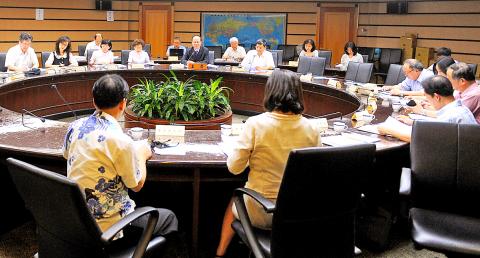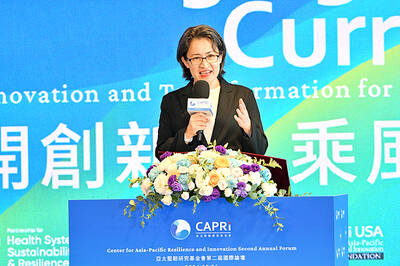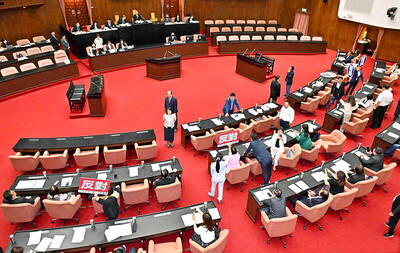The Executive Yuan’s Referendum Review Committee yesterday unanimously rejected a referendum proposal on the Fourth Nuclear Power Plant in New Taipei City’s Gongliao District (貢寮), saying that the proposal failed to meet requirements as stipulated in the Referendum Act (公民投票法).
“All 13 Referendum Review Committee members who attended the meeting believe that the question asked in the proposal, and the stated reason for the proposal, are contradictory and may confuse voters, obstructing them from understanding the question asked by the proposer,” Referendum Review Committee Chairperson Chu Hsin-min (朱新民) told reporters immediately after the 2.5-hour meeting. “Therefore, all 13 of them voted to reject the proposal.”
Chu said that while the question asks voters “Do you agree to allow Taiwan Power Co (Taipower, 台電) to insert fuel rods into [the reactors] of the Fourth Nuclear Power Plant in New Taipei City, and start test operations,” the written reason for the referendum only expresses opposition to nuclear power.

Photo: Chu Pei-hsiung, Taipei Times
“Asking whether voters agree to allow [Taipower] to insert fuel rods while expressing opposition to nuclear energy is contradictory and may confuse voters, and is therefore in violation of Article 14 of the Referendum Act, which prohibits such contradiction,” Chu said.
He added that some committee members also questioned whether “inserting fuel rods” and “starting test operations” would be considered “major national policies” that can be decided through a referendum, while others said that normal procedure is to conduct test operations before inserting fuel rods, and thus the question itself is confusing.
“Moreover, since the government has already announced that the Fourth Nuclear Power Plant would be immediately sealed upon completion of the construction and would not start operations, the referendum fails to meet the legal requirement that a referendum should aim to overturn a major national policy,” Chu said.
The above reasons led to the committee’s rejection of the referendum proposal, he said.
The committee comprises 21 members, of which 14 took part in yesterday’s review. The chairman of the committee was excluded from the vote.
Environmentalists and legislators were outraged at the decision, which would block a second-phase signature drive for the referendum, unless they win an appeal against the decision.
Taiwan Environmental Protection Union (TEPU) chairman Liu Chun-hsiu (劉俊秀) was furious at the result because the committee has “turned a deaf ear to public opinion.”
“The first stage of the petition collected more than 120,000 signatures and took us two years to complete. Two years of hard work and the hope of 120,000 people were dismissed by 13 people in less than two hours. To say that the committee is as useless as an appendix is an understatement — it is a cancer that needs to be removed so that the nation can practice real democracy,” he said.
Democratic Progressive Party Legislator Tien Chiu-chin (田秋堇) accused the committee of “playing tricks” and questioned the means by which its members were selected. She also raised doubts about the legitimacy of the unquestionable power the committee wields over referendum-related issues.
Saying that there is no real difference between the rejected referendum question and the proposed revision by the committee, which asks voters whether they “object to” Taiwan Power conducting a trial run on the plant involving fuel rods, she said that the committee is attempting to take advantage of the Referendum Act, which states that if the plebiscite’s question is not answered by at least 50 percent of the people allowed to vote in a presidential election, the answer to the question shall be deemed a denial by default.
TEPU member and signature convener Kao cheng-yan (高成炎) said that the union would ask the committee to return its proposal and submit a revised question for the plebiscite on Monday.
Kao added that the TEPU would file an appeal with the Executive Yuan’s Appeal Committee to revoke the decision, he said.
Confident that public opinion would make the more sensible judgement, he suggested that news outlets and political parties conduct public opinion polls, whose results he said would greatly increase the chance for an appeal to be upheld.

NO-LIMITS PARTNERSHIP: ‘The bottom line’ is that if the US were to have a conflict with China or Russia it would likely open up a second front with the other, a US senator said Beijing and Moscow could cooperate in a conflict over Taiwan, the top US intelligence chief told the US Senate this week. “We see China and Russia, for the first time, exercising together in relation to Taiwan and recognizing that this is a place where China definitely wants Russia to be working with them, and we see no reason why they wouldn’t,” US Director of National Intelligence Avril Haines told a US Senate Committee on Armed Services hearing on Thursday. US Senator Mike Rounds asked Haines about such a potential scenario. He also asked US Defense Intelligence Agency Director Lieutenant General Jeffrey Kruse

INSPIRING: Taiwan has been a model in the Asia-Pacific region with its democratic transition, free and fair elections and open society, the vice president-elect said Taiwan can play a leadership role in the Asia-Pacific region, vice president-elect Hsiao Bi-khim (蕭美琴) told a forum in Taipei yesterday, highlighting the nation’s resilience in the face of geopolitical challenges. “Not only can Taiwan help, but Taiwan can lead ... not only can Taiwan play a leadership role, but Taiwan’s leadership is important to the world,” Hsiao told the annual forum hosted by the Center for Asia-Pacific Resilience and Innovation think tank. Hsiao thanked Taiwan’s international friends for their long-term support, citing the example of US President Joe Biden last month signing into law a bill to provide aid to Taiwan,

China’s intrusive and territorial claims in the Indo-Pacific region are “illegal, coercive, aggressive and deceptive,” new US Indo-Pacific Commander Admiral Samuel Paparo said on Friday, adding that he would continue working with allies and partners to keep the area free and open. Paparo made the remarks at a change-of-command ceremony at Joint Base Pearl Harbor-Hickam in Hawaii, where he took over the command from Admiral John Aquilino. “Our world faces a complex problem set in the troubling actions of the People’s Republic of China [PRC] and its rapid buildup of forces. We must be ready to answer the PRC’s increasingly intrusive and

STATE OF THE NATION: The legislature should invite the president to deliver an address every year, the TPP said, adding that Lai should also have to answer legislators’ questions The Chinese Nationalist Party (KMT) yesterday proposed inviting president-elect William Lai (賴清德) to make a historic first state of the nation address at the legislature following his inauguration on May 20. Lai is expected to face many domestic and international challenges, and should clarify his intended policies with the public’s representatives, KMT caucus secretary-general Hung Meng-kai (洪孟楷) said when making the proposal at a meeting of the legislature’s Procedure Committee. The committee voted to add the item to the agenda for Friday, along with another similar proposal put forward by the Taiwan People’s Party (TPP). The invitation is in line with Article 15-2